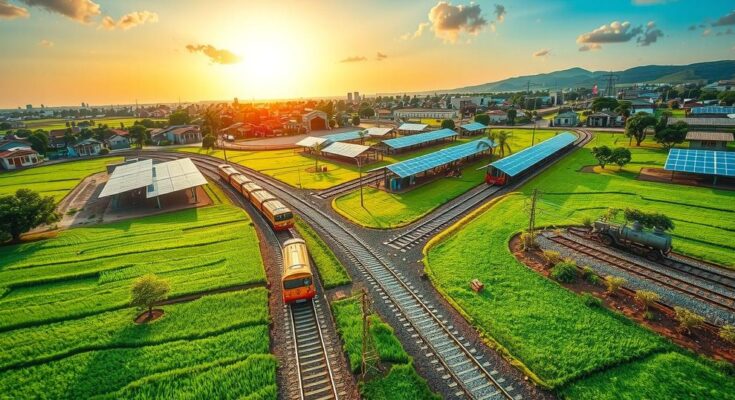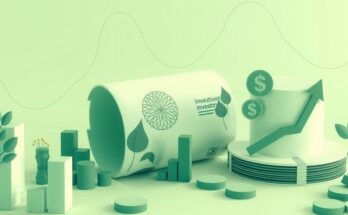Dr. Akinwunmi Adesina highlights Nigeria’s declining per capita GDP, exposing economic mismanagement compared to South Korea’s growth. Critics challenge the accuracy of these claims, as the government struggles with inflation and living costs among citizens. Calls for urgent structural reforms include energy investments, railway revitalizations, and agricultural innovations to achieve economic recovery and equity.
In a recent discussion, Dr. Akinwunmi Adesina, President of the African Development Bank, shed light on Nigeria’s economic stagnation, revealing that the per capita GDP has plummeted from a promising $1,857 in 1960 to a stark $824 in 2024. This stark appraisal stands in sharp contrast to South Korea, where GDP soared from a mere $158 in 1960 to an astonishing $36,157 in 2024, underscoring a troubling trajectory for Nigeria.
The Independent Media and Policy Initiative (IMPIC) has challenged Adesina’s figures, claiming Nigeria’s actual 1960 per capita GDP was $93, not $1,857. However, neither side has substantiated their claims with clear evidence, adding to the confusion over the true state of Nigeria’s economic history. As President Bola Tinubu nears the mid-term mark of his presidency, critical economic indicators reveal a grim outlook for the populace, indicating a pressing need for robust economic reforms.
The monetary environment in Nigeria is increasingly harsh, with soaring inflation, rising lending rates, and an exchange rate that takes a toll on essential goods like food and transport. Many Nigerians now face dire economic realities, with significant portions of the populace struggling to meet basic living costs. The pressure has intensified under this economic climate, which many attribute to the heavy burdens of subsidies for critical services like fuel and electricity.
Interestingly, the World Bank and the International Monetary Fund (IMF) have drawn criticism for their previous endorsements of the very policies that led to economic distress. There seems to be a disconnect between their current stances and prior support for economic liberalization, leaving many in Nigeria puzzled over their inconsistent messaging.
The government has made some attempts to alleviate the economic strain through short-term solutions such as cash transfers and food assistance, yet these measures seem inadequate and poorly targeted. There is also a noticeable lack of substantial policy initiatives aimed at longer-term economic recovery. It is more of a reactive approach than a proactive strategy.
Many observers believe that as the 2027 general elections loom, political distractions are likely hindering necessary economic innovations. What would be beneficial now is the formulation of a Marshall Plan for Nigeria, aimed at ambitious economic recovery and revitalization efforts to set a proper path forward for the nation.
One practical step would be to expand investments in renewable energy, particularly solar energy, beyond government buildings to vital public institutions, including medical facilities and various educational establishments. This investment could help alleviate energy dependency and foster greater productivity.
Additionally, reforming the electricity sector is crucial. The current fragmentation among electricity generation and distribution entities ought to be reconsidered, advocating for more integrated models to enhance efficiency and reliability.
Moreover, state-led initiatives should revitalize outdated waterworks to ensure clean water access, thereby supporting public health and industrial needs. Similarly, the revival of railway systems would facilitate transport for industries and agriculture, connecting production to markets more effectively.
The focus on agriculture must not be overlooked either. It is essential to summon resources to re-establish and modernize farm settlements that once thrived under leaders like Obafemi Awolowo, promoting both food production and cash crops through partnerships with private investors.
Nigeria’s reliance on import substitution is unsustainable and presents significant risks for the economy. A concerted effort needs to be made toward establishing a cohesive industrial strategy. Public and private partnerships should be prioritized to develop and manufacture essential industrial machinery domestically—a necessity for economic resilience.
The government must also firmly support sectors like automobile manufacturing and reinvigorate the textile industry for job creation, especially for the country’s youthful population seeking employment. It cannot be enough to simply provide funding; systemic follow-ups and targeted initiatives need to be established.
Furthermore, the naira-for-petroleum policy should be implemented with greater seriousness to decrease reliance on foreign exchange, thus lessening the economic strain. The commitment to ramping up crude oil production is critical, aligning with development goals and funding public programs.
Lastly, addressing security issues tied to terrorism and regional threats remains paramount. The government needs to consider a detailed review of ECOWAS protocols concerning inter-border movements, tackling not just the symptoms but the root causes of insecurity that also affect the economy.
With these comprehensive measures, Nigeria can aim for an ambitious annual GDP growth rate of seven percent, ultimately steering the nation towards the proposed $1 trillion economy by 2030. Allocating resources equitably to bridge the wealth gap is essential as well, particularly in light of recent increases in state government revenue from subsidy removals, which must be transparently redirected to foster economic justice.
In conclusion, concerted efforts from both Federal and State governments are vital to implementing policies that not only stimulate economic performance but also ensure that benefits reach all Nigerians in a fair manner. The urgency for these initiatives cannot be overstated, as the nation continues to navigate its complex economic landscape.
In summary, Nigeria faces pressing economic challenges that require immediate and strategic action. To foster recovery, the government should prioritize investment in renewable energy, overhaul the electricity sector, and revive agriculture while forming a cohesive industrial policy. Addressing security issues will also be vital in bolstering economic stability. Only through coordinated and targeted initiatives can Nigeria hope to achieve its ambitious economic goals and alleviate social disparities affecting its citizens.
Original Source: punchng.com




